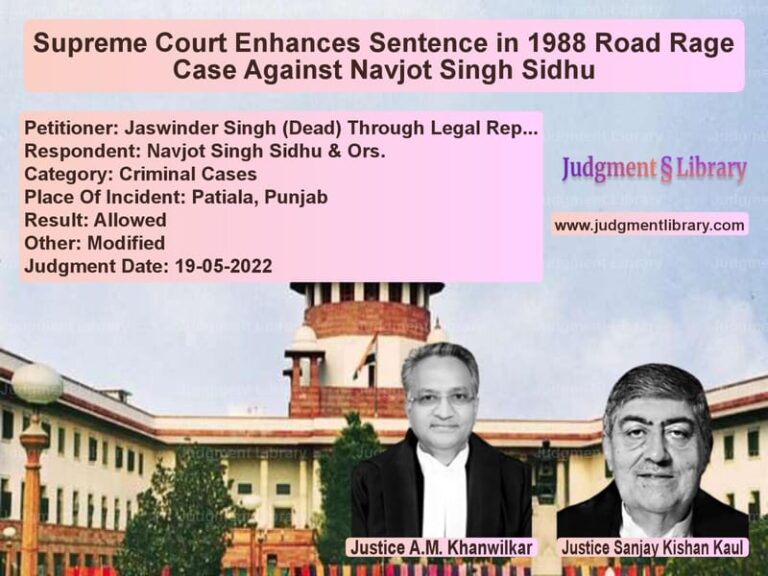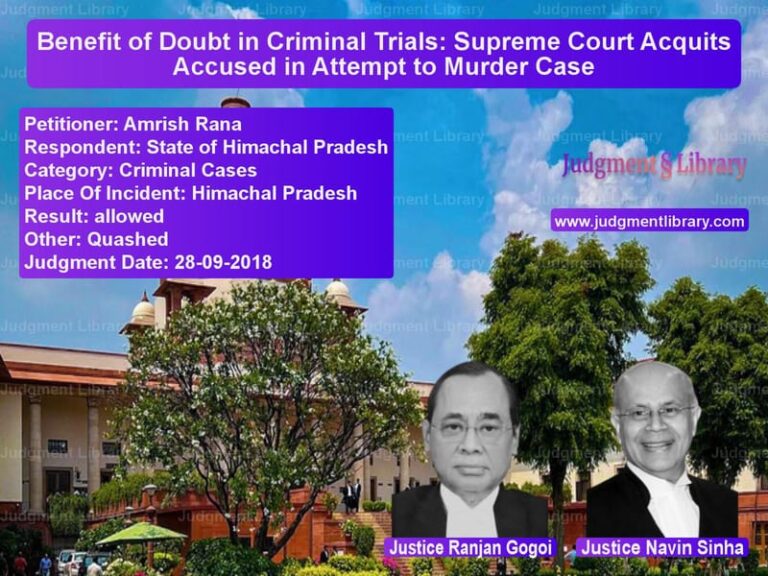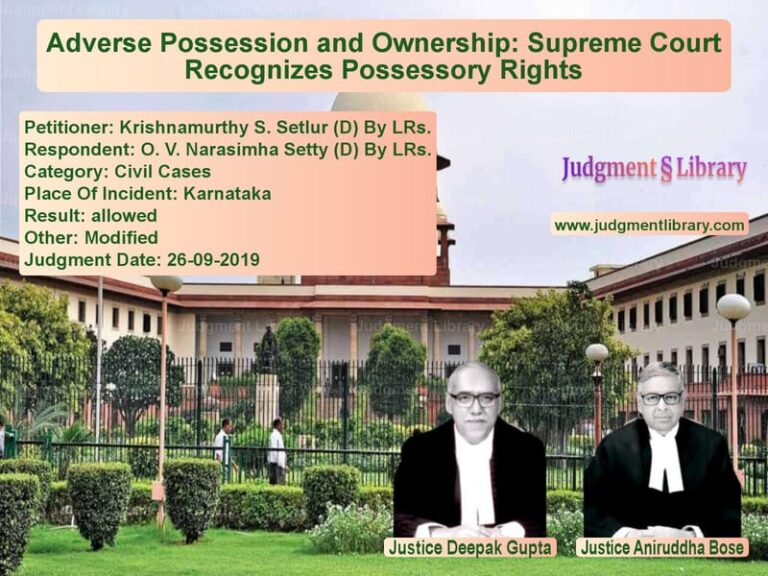Cheque Bounce Case: Supreme Court Rules on Presumption Under Negotiable Instruments Act
The case involves the Oriental Bank of Commerce (appellant) and Prabodh Kumar Tewari (respondent) concerning a cheque dishonor dispute under Section 138 of the Negotiable Instruments Act, 1881 (NI Act). The dispute arose when the respondent issued a cheque, which was later dishonored due to insufficient funds. The Supreme Court was tasked with determining whether a handwriting expert’s opinion on who filled in the cheque details was necessary for the case.
Background of the Case
The appellant, a corporate banking entity, claimed that a consortium of companies, including Century Communications Ltd and others, availed credit facilities from them. The outstanding dues amounted to more than Rs 1200 crores. To cover part of these dues, the first respondent issued a cheque for Rs 5.57 crores dated 26 December 2011, drawn on Indian Overseas Bank. However, when the cheque was presented in May 2012, it was dishonored due to insufficient funds.
Read also: https://judgmentlibrary.com/supreme-court-quashes-rape-charges-in-consensual-relationship-case/
Following this, the appellant issued a legal notice on 5 June 2012 and subsequently filed a criminal complaint under Section 138 of the NI Act before the Additional Chief Metropolitan Magistrate, Dwarka Courts, New Delhi.
Legal Proceedings Before the High Court
During the trial, the respondent admitted that the cheque bore his signature but contended that it was a blank signed cheque given as security. The respondent then filed an application requesting a handwriting expert to verify whether he had filled in the cheque details.
The Magistrate dismissed this request, stating that under Section 139 of the NI Act, once a cheque is signed and issued, there is a presumption that it was issued for discharge of a debt or liability unless rebutted. However, the High Court, in its judgment dated 24 July 2019, permitted the respondent to engage a handwriting expert to verify the authorship of the cheque details.
Arguments Before the Supreme Court
Petitioner’s Arguments (Oriental Bank of Commerce):
- The appellant argued that once a cheque is signed, a presumption arises under Section 139 of the NI Act that it was issued for a debt or liability.
- They contended that the details of who filled in the cheque were immaterial as long as the cheque bore the signature of the respondent.
- They relied on judicial precedents affirming that an accused cannot avoid liability merely by claiming that someone else had filled in the cheque details.
Respondent’s Arguments (Prabodh Kumar Tewari):
- The respondent contended that a blank cheque was handed over as security, and he never authorized the filling of details.
- He sought an expert opinion to determine whether he had filled in the cheque’s amount, date, and payee name.
- He argued that allowing the handwriting expert’s report would help prove that the cheque was misused.
Supreme Court’s Observations
The Supreme Court examined the scope of Section 139 of the NI Act, which states:
“It shall be presumed, unless the contrary is proved, that the holder of a cheque received the cheque for the discharge, in whole or in part, of any debt or other liability.”
The Court referred to the case of Bir Singh v. Mukesh Kumar (2019) and held:
“A meaningful reading of the provisions of the NI Act, including Sections 20, 87, and 139, makes it clear that a person who signs a cheque remains liable unless they provide evidence to rebut the presumption. It is immaterial whether the cheque was filled in by the drawer or another person.”
The Court further cited Kalamani Tex v. P. Balasubramanian (2021), which reiterated that signing a blank cheque does not absolve the drawer from liability.
On the issue of handwriting verification, the Supreme Court observed:
“The presumption which arises under Section 139 cannot be rebutted merely by proving that the details in the cheque were not filled by the drawer. The drawer remains liable unless it is proved that the cheque was not issued for discharge of a debt.”
Thus, the Court concluded that the High Court’s decision to allow handwriting examination was unnecessary and would not serve the purpose of rebutting the presumption under Section 139.
Supreme Court’s Verdict
The Supreme Court allowed the appeal and set aside the High Court’s order. It ruled:
“The application for the examination of a handwriting expert is dismissed. The present order shall not affect the merits of the trial or the rights of the parties.”
Impact of the Judgment
This ruling has significant implications for cheque bounce cases under the NI Act:
- It reaffirms that a drawer who signs and issues a cheque is presumed liable unless they provide substantive evidence to the contrary.
- It eliminates the defense of questioning who filled in the cheque details.
- It ensures that accused persons cannot delay proceedings by engaging handwriting experts unnecessarily.
This decision strengthens the legal framework protecting financial transactions and ensures accountability in negotiable instruments.
Petitioner Name: Oriental Bank of Commerce.Respondent Name: Prabodh Kumar Tewari.Judgment By: Justice D.Y. Chandrachud, Justice A.S. Bopanna.Place Of Incident: New Delhi.Judgment Date: 16-08-2022.
Don’t miss out on the full details! Download the complete judgment in PDF format below and gain valuable insights instantly!
Download Judgment: oriental-bank-of-com-vs-prabodh-kumar-tewari-supreme-court-of-india-judgment-dated-16-08-2022.pdf
Directly Download Judgment: Directly download this Judgment
See all petitions in Fraud and Forgery
See all petitions in Cheque Dishonour Cases
See all petitions in Judgment by Dhananjaya Y Chandrachud
See all petitions in Judgment by A. S. Bopanna
See all petitions in allowed
See all petitions in Quashed
See all petitions in supreme court of India judgments August 2022
See all petitions in 2022 judgments
See all posts in Criminal Cases Category
See all allowed petitions in Criminal Cases Category
See all Dismissed petitions in Criminal Cases Category
See all partially allowed petitions in Criminal Cases Category







